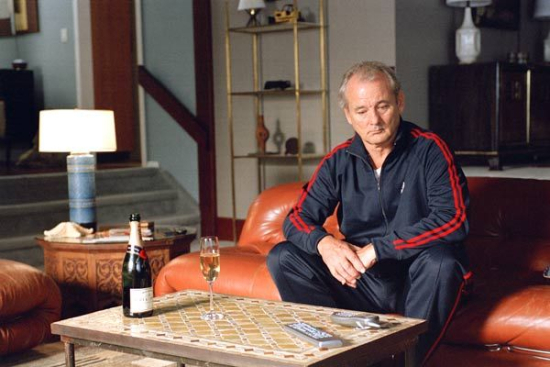By Cole Smithey
In Jim Jarmusch's enjoyable upcoming film "Broken Flowers" Bill Murray plays Don Johnston, an aging bachelor who goes on a cross-country journey to visit four of his ex-girlfriends (played by Francis Conroy, Sharon Stone, Jessica Lange and Tilda Swinton) in search of a son he may have sired 20 years ago. Don's bizarre experiences during his unannounced visits make for some terrific minimalist cinema that serves to crystallize Bill Murray's sardonic post-modern screen persona as emblematic of American adult male consciousness. Bill Murray isn't just funny and entertaining; he's complex, restrained and acutely honest. His brand of humor is something to be savored for its every delicate trace of beaten-to-the-punch wisdom and effortless resolve.

Q: With "Lost In Translation" and "Broken Flowers" you've perfected your minimalist style of humor. How is it that you are able to do so much more with so much less than most actors?
BM: I think in my case the minimalism comes from a deterioration of ability, an erosion of skills, so I just have less and less to give all the time.
This is kind of a psychological detective story, so a little bit at a time keeps you intrigued. There's not a lot of dialogue for me. I basically have to get beaten up by these women through most of the movie, and have to be surprised at what the information is, so most of what I give is just being stung by whatever they say. It's tough to go back and meet the loves of your life. You kind of misremember exactly how well it went at the time, and when you go back you're going to be affected by, not only the hurt that you've caused, but also by the love that you may have passed on. If you've forgotten any of it, it still affects you when you see them.
Q: Have you ever tried to track down an old flame?
BM: Well, I've tried but I usually decide to try in the middle of the night in a strange town, so I've not had great success with it but they've always been interesting evenings – always. I don't recommend it for most people, but I think we all have someone that we think, "Maybe I didn't give myself or that person enough of a chance." I think that I think about people in my past a lot more all the time. Once again, I think that's the mind eroding and the deterioration of my sanity, but having done it in this film I would say it's a far more precarious proposition than I would have guessed before. Just doing it for six weeks with four different actresses, I found it to be unsettling and disturbing. Just being on uncertain footing all the time – you might want to try going to a circus camp or something for a couple of weeks instead. You'll get the same sort of feeling trying to swing on a trapeze.
Q: Did you do any special preparation for this role?
BM: I don't really think that way much about acting. I try as much as I can to be there when the camera actually rolls. I think that's the most important thing. If you're with good actresses or actors that's as much as you can hope to do I think. I've tried a little bit of that backstory stuff, but it tends to sort of take you out of where you are – it takes you a little bit away from the moment. It's nice to think about before, but when you're actually rolling you just try to show up.
Q: You're one of the last of the Saturday Night Live early guard to still be making movies. What's your secret?
BM: I care.
No, some of us still eat breakfast cereal everyday. It's not always a good thing.
Q: Your characters in "Lost In Translation" and "Broken Flowers" suffer different kinds of mid-life crisis. Can you relate?
BM: I have crises on a regular basis, and they're not suggested by how old I am or by how much living I've done – it's just the kind of living I've been doing that's been a real problem. When you're not engaged in whatever your particular problem is then a part of the clothing that you wear can be a jolly way of behavior. You can be very happy-go-lucky about something you're avoiding. How often do you hear, "Oh, he seemed so positive and upbeat all the time, I can't believe he killed his entire family."
I think Tilda Swinton made the point about "Broken Flowers" being about a question and never really getting the answer, and that is really an interesting design for this character. You just keep returning to the questions again, and that's sobering because we're in a result oriented world and if you don't get them, and you only get questions, then that gets away from your "happy." I think this guy's pretty sober at the end – I don't think he's sad because you have a feeling that at least he tried something and went for it. He became a person for awhile in the cause of trying to know something — trying to know the answer to a question. Whether you get the answer or not isn't so important, it's that you're there trying.




